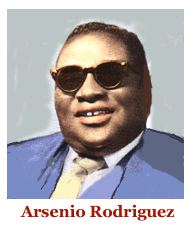One evening at a concert in New York City, the late Afro-Cuban singer and guitarist Aresenio Rodriguez shouted to the audience his pride in his African heritage. Today, I'm meeting more and more Afro-Latinos, in person and on Facebook, who are speaking out on their ethnic pride. Then there are other Afro-Latinos who are in denial about their ethnicity, and don't even consider themselves Black. Still there are others who are a bit confused as to which part of their identity they should embrace.
In the brief clip below, Tore, one of the interviewees says, and I've heard it a few times from other Afro-Latinos that the fair-skinned and White Latinos don't always accept Afro-Latinos as fellow Latinos. Tore states that he feels like a low man on the totem pole from his fellow Puerto Ricans. This comment was an eye-opener for me because I grew up with Puerto Ricans in New York City, and noticed a lot of social and political interaction between African American and Puerto Rican communities. Juan, an Afro-Venezuelan friend also surprised me when he told me that most Latinos in the US will not respond to him in Spanish because they equate him with being a Black American even though Spanish is his first language.
I liked what Guzman said about identifying not as just Black, but more specifically Afro-Colombian. However, I was somewhat taken aback when he talked about an African-American women he was dating who told him that this is the first time that she went out with a non-Black guy. This reminded me of what a Black Cuban friend, Jesus, told me long ago when an African-American bank teller noticed his name had a Spanish ring to it, and said to Jesus, Oh, I thought you were Black! A lot of African-American people, not all, but many, seem to think that African-Americans are the only legitimate Blacks on the planet, and the rest are just imitators. The Afro-Colomnian Guzman added that one of his African-African classmates told him that he looks Black but he really isn't.
The female interviewee in this clip, Raquel, addressed the internalized racism that is prevalent among many members of the African diaspora when her father, who is a Black Dominican, told her to never bring home anyone Black, not even as a friend. Tore commented on how he has seen many Afro-Latinos struggling trying to decided if they should embrace being Black or Latino. Guzman, the Afro-Colombian, stated so eloquently that they should see both being Black and Latino as equal.

That's a shame that some American Blacks still don't realize that the transatlantic slave trade took Africans to many places in the New World, not just to the USA. I guess some people do not want to go to the library and read a book. I have only traveled a little bit outside the USA, but I always knew that there were Black people in other parts of the world besides the US and Africa. For me personally, I identify anyone as Black if they have a substantial amount of ancestry from subsaharan Africa,negroid features, etc, regardless of what language they speak or what country that they come from. It is sort of embarassing that some Americans are so ignorant.
ReplyDeleteI just watched this video clip and found it interesting. I don't mean to nitpick or be judgemental about anyones facial features, but all of the people in this video definitely looked like they had a lot of racial admixture in their genes. The girl in the video looked more East Indian than Afro descent. She would blend in very easily in a crowd of Indian people. I am not meaning to be critical, because there are a lot of Black Americans who look very white or Indian. I just thought that this was interesting. All of the presenters seemed like a very nice and intelligent group of young people.
ReplyDelete